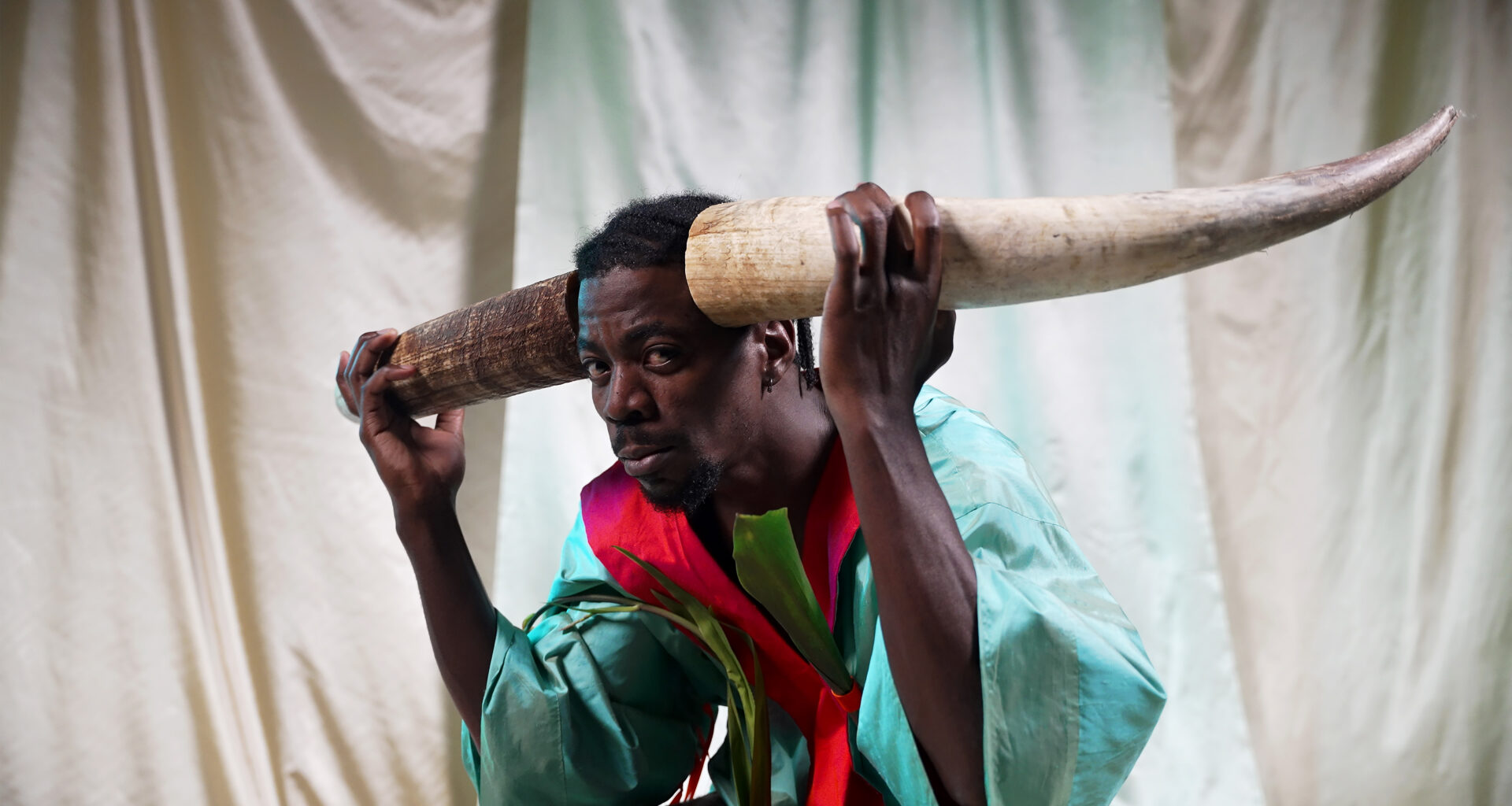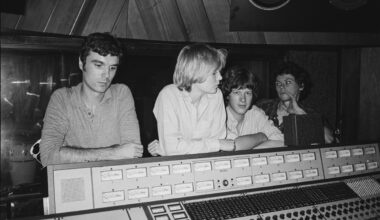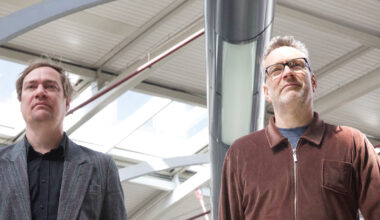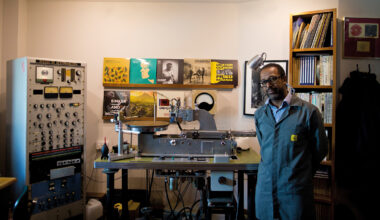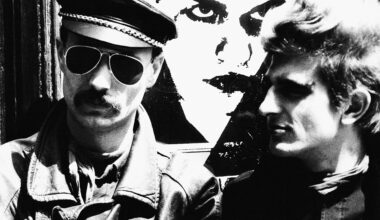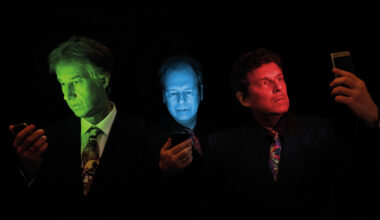A pioneer who made his name as a significant figure on East Africa’s vibrant electronic scene, Faizal Mostrixx explains his unique take on Afrofuturism
Whether you’re talking Düsseldorf or Detroit, the Balearics or the Bronx, London or LA, certain key places provide the backdrop for the history of electronic music. These are the locales where groundbreaking artists and genre-defining scenes have emerged down the years.
So far, it has largely been a story of the industrialised world – of musicians in Europe, North America and Japan imagining the future in radical ways. But it’s also a story of cultural exchange. And in a digital age where all music is available to everyone all the time, and powerful music-making tools can be accessed by smartphone, these exchanges have become truly international.
Just ask Faizal Mostrixx, the Ugandan producer, musician, DJ, dancer and choreographer. His artistic take on what lies ahead, laid out on his new album ‘Mutations’, draws on influences from around the world while also being deeply rooted in Afrofuturism, a cultural aesthetic that mixes up elements of science fiction, fantasy and history – especially reflections on the past that challenge Western narratives of the colonial era.
“I think I have been living Afrofuturism,” he says down the line from Switzerland, where he’s been working. “It’s been there in our lives since we were kids, you know, and it’s just today’s way of presenting the idea of innovation in an African sense.”
Afrofuturism is both “concept” and “process” for Mostrixx.
“It’s a way to put my roots into the modern perspective, and how I interpret the past, the future and the present in one,” he adds.
To see how timelines converge in Mostrixx’s work, it helps to understand his fascination with kadodi music played at the imbalu, a public circumcision ceremony associated with eastern Uganda and the Bagisu people.
“It’s accompanied by a specific rhythm that is syncopated, very, very fast, and hypnotising,” he says. “People drum and trot around at the ceremony, which brings about a kind of hypnotic state. I very much like the rhythm itself and the idea that music can heal, can help relieve pain.”
In other words, it’s a rhythm to get someone into a kind of trance so that circumcision doesn’t hurt so much?
“Exactly, so they feel stronger. The syncopation and the rhythm pattern are very energising. And I like that because from there, when I deconstruct this rhythm, you find there is a lot of feeling, a lot to play with. There are a lot of dynamics.”
Field recordings dating back to the middle of the last century also underpin much of the music on ‘Mutations’. After the release of his DIY debut, ‘Tribal Match’ in 2017, Mostrixx was offered access to South Africa’s International Library of African Music.
“They gave me samples, so I keep on revisiting them to see which sounds worked,” he explains.
He then treated these recordings to give them “different atmospheres”. Add in his collaborations with musical contributors ranging from Ugandan singer and multi-instrumentalist Giovanni Kiyingi to Kebenesh – who sings a cappella on the track ‘Onions And Love’ and works chopping onions at a restaurant in Addis Ababa – and you begin to get an idea of the range of elements that play into his take on Afrofuturism.
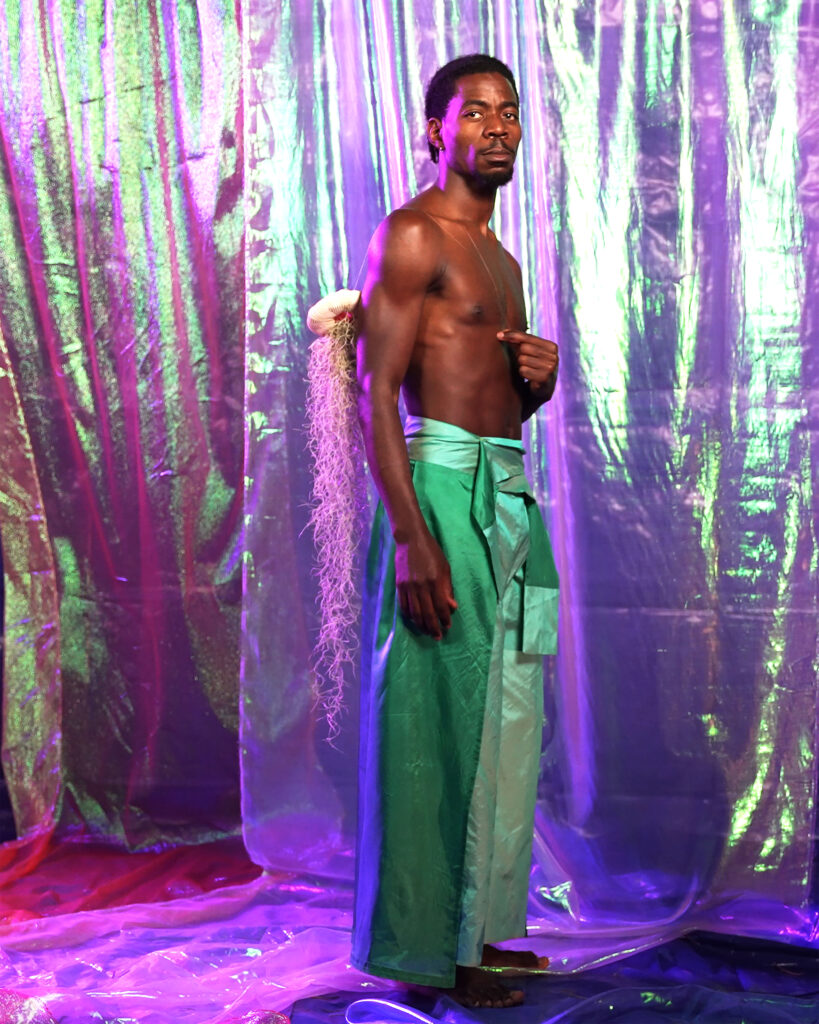
On ‘Mutations’, the sum of these parts is an album often aimed squarely at the dancefloor but which is also immersive, expansive and detailed enough for repeated home listening. The same can be said of his 2022 EP, ‘Transitions’, similarly titled to reflect the idea of changing states. Chris Eckman (formerly of The Walkabouts), Mostrixx’s label boss at Glitterbeat, says of him: “Not all his compositions are loop-based. Sometimes they’re very linear, almost like classical music. There are movements.”
As to how Mostrixx reached the point where he has the ability to deliver such an album, it’s an unconventional story that can be traced to his Kampala childhood. Back then, he jokes, his job as the “second last” of seven siblings was to be happy. It was a loving environment.
“Faizal means ‘the boy of happiness’,” he says. “You can imagine growing up with all these siblings watching out for you, where everyone is caring for you.”
Mostrixx was close to his mother, a musician and traditional dancer. He would travel around with her, watching her perform for local audiences and at corporate events. He also saw how she worked between shows with a coach or choreographer.
“I grew up being part of these practice sessions,” he says. “I remember seeing people drumming, the choreography, how things got put together and then seeing it on stage. For me, it was magical to watch my mum and this troupe. It was like, ‘Wow, all the time they are working for this’. I really got driven by that energy.”
As a kid, you would guess that Mostrixx was a bit of a show-off and not someone who enjoyed his lessons much. He certainly hated the strictness of Uganda’s education system. What he did like was the idea that a roomful of 70 kids could be an audience. Michael Jackson, Rambo and kung-fu movies provided the basis for impromptu presentations at his primary school when the teacher left the class unattended.
“The idea of performing started at that age,” he says. “But professionally, as I went on, I discovered breakdance and hip hop. I started travelling as a dancer, and I couldn’t believe you could do that and get paid. I remember getting maybe 80,000 Ugandan shillings [roughly £17] and I was so happy.”
Before becoming a musician, Mostrixx first began to make his way as a dancer in what sounds like a far more conventional showbiz world than the one he occupies now. He recalls dancing in a bar, miming to Chris Brown and Bruno Mars, and posting “socials”. People began to comment on his style because it was unconventional.
“At that time, I realised by accident that I could push things in different directions,” he says. “I started taking workshops and training with other groups, but as a dancer, not really music.”
He was growing up in public, learning his craft. And even before he began making sounds in earnest, he found himself “in charge of mixing music and finding the right beats”.
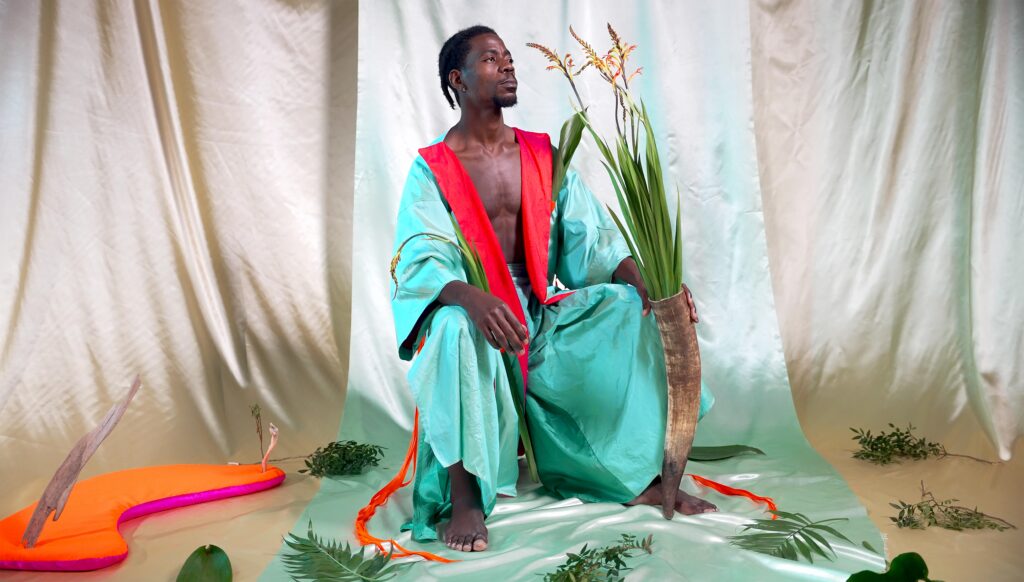
His time with breakdance collective Tabu Flo was also formative.
“They accepted me into the group because of my fusion style, because I was experimental,” he remembers. “They blended two dance styles – the hip hop and the traditional.”
All of which has played into how he creates music.
“I compose from a very visual perspective,” he says. “Sometimes, it’s just a scene in my head that I imagine as a choreographer. I’m singing in the rain or going through a ritual, and I build sound around that.”
“There’s a certain freedom to his compositions that I think is reflected in the freedom of dance,” Chris Eckman says of Mostrixx. “There’s a looseness… the compositions don’t feel locked down to certain kinds of rhythmic patterns or bass sounds.”
To compose in this way is a technical challenge, and Mostrixx’s father was a formative influence. A truck driver and the owner of a hardware store who also fixed electrical gear, he was a music fan who collected CDs and tapes on his travels, mostly in Kenya.
“My dad had a rack of equalisers and amplifiers,” Mostrixx recalls, and although the kit was in his father’s room, that didn’t stop the young boy being fascinated by it.
“I would blow things up and my dad would fix them,” he continues. “He realised I was interested and started teaching me how everything worked.”
As with dance, it’s a childhood memory that explains a lot about how he came to move beyond simply finding beats.
“It was me as a kid discovering all this music, this world of no limits,” he says. “Not being in a class and being told what to do, but more, ‘Let’s experiment and see what this machine can do’.”
With this kind of background, it was natural that he would be drawn to making electronic music – on a DIY basis at first.
“My first music software was FruityLoops. It was on my brother’s computer. So I went on it randomly, accidentally, and it was like, ‘This software makes beats, it creates music!’. It was the first time I heard that something creates music, you know? As a child, listening to a speaker, I thought there was someone sitting in there and wondered, ‘How can they go in the speaker?’. So getting this software that could make beats for me was fascinating.”
Mostrixx taught himself how creative software worked. From the off, he was mixing up music, both traditional and modern.
“I was very open to different styles of music as a creator,” he says.
The advent of digital technologies in Uganda offered a window on the world, and it’s easy to overlook just how recently all this occurred and the changes it brought about. According to Chris Eckman, he’s observed a “foundational shift in music” in West Africa, as large ensemble bands have given way to “laptop-created electronic music” and dancehall-style acts where the performer just has a microphone and a backing track. Local labels and studios have closed down. Economic factors have created “a necessity for very streamlined production” of a kind that’s arguably only possible with electronic music.
“It was 2008 when I first went to an internet cafe,” Mostrixx says, talking as someone who has lived and built a career throughout this shift. “I was into it like crazy. It wasn’t like today where everything is connected so fast. Back then, internet cafes had a bunch of desktops and you would pay 500 shillings for 25 minutes. Can you imagine?”
He’s laughing, but this access to the web was important because it unlocked a world of different music styles and related technicalities.
Inspiration also sometimes came via the Nyege Nyege collective (the name translates roughly as “a sudden, uncontrollable urge to dance”) which Mostrixx has been associated with on and off for several years. Set up by Arlen Dilsizian and Derek Debru, Kampala-based Nyege Nyege Tapes offers an outlet for electronic and outsider music from all around Africa.
In 2015, Nyege Nyege began organising an electronic music festival in Jinja, on the north shores of Lake Victoria in Uganda. The event acts both as a showcase for East African electronic artists and as a chance for these artists to see European acts. In 2022, when the first post-pandemic festival was held at Itanda Falls, more than 300 DJs and performers participated across seven stages. Such is the festival’s reputation that as many as 5,000 tourists were among the 12,000 people in attendance.
“Seeing European acts made you realise that it’s possible to use these tools to boost creativity,” Mostrixx says of the opportunity, which allowed him to eavesdrop on what his contemporaries around the world were doing.
But the kind of openness the festival represents is not met with universal approval in Uganda. The authorities have considered banning the festival on moral grounds. President Yoweri Museveni, who took power in 1986 and has become increasingly authoritarian in recent years, has spoken out against “deviations” supposedly imported from the West which are not to be normalised. In March, Ugandan MPs passed an anti-LGBTQ+ bill imposing the death penalty for “aggravated homosexuality”. It was signed into law by Museveni in May.
Kampala’s underground electronic music scene, which has offered safe spaces for the LGBTQ+ community in East Africa, is possibly facing an existential threat. In a recent Guardian news feature on the subject, reporter Frank L’Opez changed the names of interviewees for the sake of their safety. Although Mostrixx is now based in France, where he has a child, his success grew in part from this scene and he’s clearly concerned about what’s going on.
“This is the world we’re living in today… we’re all lost in this identity crisis,” he muses. “Who is who? Who is a ‘she’? Who is a ‘he’? We’re forgetting the essence of humanity. We are picking on each other because of gender instead of focusing on the art and letting everyone do as they please.”
The kid rebelling against the rules of an overly strict schooling bubbles to the surface, albeit in a very different context. But he tries to stay optimistic, suggesting that, whatever happens, Ugandans will find ways of getting together and making their music heard because it’s too good not to be heard.
“I feel like electronic music and the underground is the breathing source of originality, of authentic new sounds,” he reasons.
We’re back to Afrofuturism, which perhaps isn’t surprising considering it’s been a recurring theme across two 40-minute conversations. Yet it’s an imprecise label to put on what Mostrixx does – creating a unique fusion of specific underground/traditional sounds and pushing music into new spaces.
“I think it’s a lot like punk rock, which means different things to different people,” Chris Eckman says of Afrofuturism, a term that after all links the work of Sun Ra, Parliament/Funkadelic, Janelle Monáe and even Lee “Scratch” Perry. “For some people, it’s a musical style. To others, it’s a complete attitude, about rejecting ‘virtuoso-ism’. For every person’s five-point list of what punk is, there are two or three elements that are shared and a couple that are just very individual. And I think in Faizal’s case, that’s true of his Afrofuturism.”
“We hear traditional music, we know about drums – that’s already there,” says Mostrixx. “But to enhance it and give it a new feel is through machines and technology. We can’t avoid that. You’ve got to evolve with machines.”
The past, present and future once again converge, as they do so often in the worldview and work of Faizal Mostrixx.
‘Mutations’ is out on Glitterbeat
